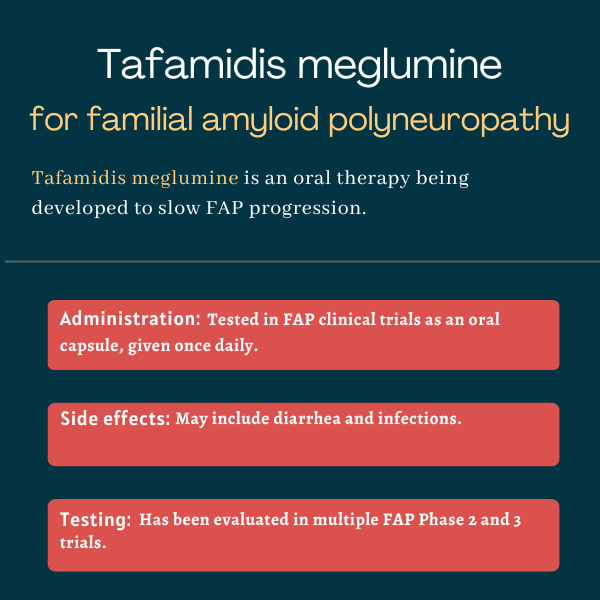Tafamidis meglumine for FAP
Last updated March 20, 2024, by Marisa Wexler, MS

What is tafamidis meglumine for FAP?
Tafamidis meglumine is an oral treatment designed to prevent the accumulation of toxic protein clumps and slow disease progression in people with familial amyloid polyneuropathy (FAP), also known as hereditary transthyretin amyloidosis with polyneuropathy.
The therapy, which is being developed by Pfizer, has been approved in the European Union under the brand name Vyndaqel since 2011 as a treatment for adult FAP patients with stage 1 polyneuropathy. But the U.S. Food and Drug Administration (FDA) rejected tafamidis meglumine for adults with FAP in 2012, saying additional trials were needed to confirm the therapy’s efficacy.
In 2019, the FDA simultaneously approved tafamidis meglumine, sold as Vyndaqel, and its new formulation tafamidis free acid, sold as Vyndamax, to treat adults with transthyretin amyloid cardiomyopathy (ATTR-CM), a FAP-related disease where toxic protein clumps damage the heart instead of the nerves. At the time, Pfizer said it would continue to work on a potential approval of tafamidis meglumine for FAP patients in the U.S.
Therapy snapshot
| Treatment name: | Tafamidis meglumine |
| Administration: | Being tested in FAP as an oral capsule formulation |
| Clinical testing: | Completed multiple Phase 2 and Phase 3 trials; approved in several countries, excluding the U.S. |
How does tafamidis meglumine work in FAP?
The transthyretin (TTR) protein normally exists in a stable complex, in which four individual TTR proteins are stuck together in a structure called a tetramer. FAP is due to TTR gene mutations that cause the tetramer to be unstable, breaking up into its individual TTR proteins. These individual proteins are prone to misfolding and to forming toxic clumps that, when accumulated in body tissues, can cause serious damage.
People with FAP develop polyneuropathy, which refers to damage in several nerves, due to the buildup of toxic transthyretin aggregates mainly in nerves outside the brain and spinal cord. These clumps also may accumulate in other tissues, including the heart.
Tafamidis meglumine works by stabilizing the TTR tetramer complex. This helps keep the protein in its normal shape and prevents the formation of toxic TTR aggregates, which is expected to slow disease progression in people with FAP.
How will tafamidis meglumine be administered in FAP?
In FAP clinical trials, tafamidis meglumine was tested in the form of soft gelatin capsules containing 20 mg of tafamidis meglumine, its active ingredient. The therapy was taken as one capsule each day.
In Europe, tafamidis meglumine is administered at a recommended dose of one, 20 mg capsule taken orally once daily. However, it’s still not known if that dose and dosing regimen also will be used for FAP patients in the U.S., should the therapy ultimately be approved in the country.
Tafamidis meglumine in FAP clinical trials
Tafamidis meglumine’s safety and effectiveness in FAP patients have been evaluated in several Phase 2 and 3 clinical trials. Pfizer’s initial U.S. application was based mainly on data from a Phase 2/3 clinical trial called FX-005 (NCT00409175) and its FX-006 extension study (NCT00791492). Those trials also supported its approval in the European Union.
FX-005
The FX-005 study enrolled 128 adults, ages 18-75, with FAP due to the most common type of FAP-causing mutation, called Val30Met, at sites in South America, Europe, and the U.S. Participants were randomly assigned to take one capsule of tafamidis meglumine (20 mg) or a placebo, once daily for 18 months (about 1.5 years).
One of the study’s two main goals was to assess the proportion of treatment responders, patients with less than a two-point increase at 18 months in the Neuropathy Impairment Score in the lower limbs (NIS-LL), which measures disability associated with neuropathy, or nerve damage.
Its other main goal was evaluating changes in neuropathy’s impact on life quality, measured by the Norfolk Quality of Life Questionnaire-Diabetic Neuropathy (Norfolk QoL-DN). In both measures, higher scores indicate greater impairment.
Results from the overall trial population showed a trend toward better outcomes with tafamidis meglumine in both primary measures, but neither reached significance at 1.5 years. This likely was due to a high number of patients (21% in each arm) quitting the trial early to undergo a liver transplant — the standard of care at that time.
Analyses of the 87 patients who completed the trial and had full efficacy data available indicated that significantly more patients on tafamidis meglumine were responders on the NIS-LL scale than those on a placebo (60% vs. 38.1%). Also, Norfolk QOL-DN scores remained relatively stable in tafamidis meglumine-treated patients over time, increasing by a mean of 0.1 points, while those on a placebo experienced a worsening of 8.9 points.
Most secondary trial goals also favored tafamidis meglumine over a placebo. For example, the therapy stabilized the TTR protein as designed in 98% of patients, while no patient on a placebo showed TTR stabilization. Likewise, those on the active treatment experienced significantly lower increases on NIS-LL scores, by 52%, and had better nutritional status than patients given a placebo.
FX-006
After completing FX-005, 86 participants chose to enroll in the trial’s extension study, called FX-006, where all were treated with tafamidis meglumine for one year. Among patients continuously taking tafamidis meglumine, life quality scores remained stable over that year and neuropathy worsened at rates similar to those observed in the main trial.
For those who switched from a placebo, the monthly rate of neuropathy worsening slowed significantly, while Norfolk QOL-DN scores dropped over one year of treatment with tafamidis meglumine, indicating a better life quality.
Patients on continuous tafamidis meglumine treatment (since FX-005’s start), however, experienced less neuropathy worsening than those who began treatment 1.5 years later. This suggested that early initiation of tafamidis meglumine is associated with long-term beneficial effects on neurological disease progression.
FX1A-201
To test tafamidis meglumine in people with less common mutations, Pfizer launched a Phase 2 trial dubbed FX1A-201 (NCT00630864) that enrolled 21 FAP patients with eight FAP-causing mutations other than Val30Met. All were treated with 20 mg of tafamidis meglumine daily for up to one year.
The main goal was to evaluate transthyretin protein stabilization. Results showed that TTR was stabilized in 94.7% of patients after six weeks, and in 100% after six months and one year. Still, exploratory efficacy analysis showed worsening neuropathy over time.
An analysis comparing data between FX-005 and FX1A-201 indicated that patients with non-Val30Met mutations had longer disease duration and worse symptoms. When pooled analyses from both trials were adjusted for symptom severity at treatment start, tafamidis meglumine was found to significantly delay neuropathy progression in people with both mutation types.
FX1A-303
Participants who completed either FX-006 or FX1A-201 then could join a Phase 3 trial called FX1A-303 (NCT00925002) and receive tafamidis meglumine for up to 10 years. Data up to six years supported tafamidis meglumine’s ability to preserve neurologic function over the long term in FAP patients.
Among patients carrying the Val30Met mutation, those who started the therapy early continued to have less disability than those who were given a placebo for the first 1.5 years, indicating that the effects of a delayed treatment initiation still were evident up to seven years later.
Results covering 93 patients followed for up to 8.5 years showed a low mortality rate, with 11 deaths documented. In addition, survival rates were better for those with Val30Met at nine years than for those without this mutation at eight years (85% vs. 75%).

Common side effects of tafamidis meglumine
The most commonly reported side effects of tafamidis meglumine in FAP clinical trials include:
- diarrhea
- urinary tract infection
- flu
- upper respiratory tract infections
- pain in the extremities
- headache.
FAP News Today is strictly a news and information website about the disease. It does not provide medical advice, diagnosis or treatment. This content is not intended to be a substitute for professional medical advice, diagnosis, or treatment. Always seek the advice of your physician or other qualified health provider with any questions you may have regarding a medical condition. Never disregard professional medical advice or delay in seeking it because of something you have read on this website.
Recent Posts
Related articles






